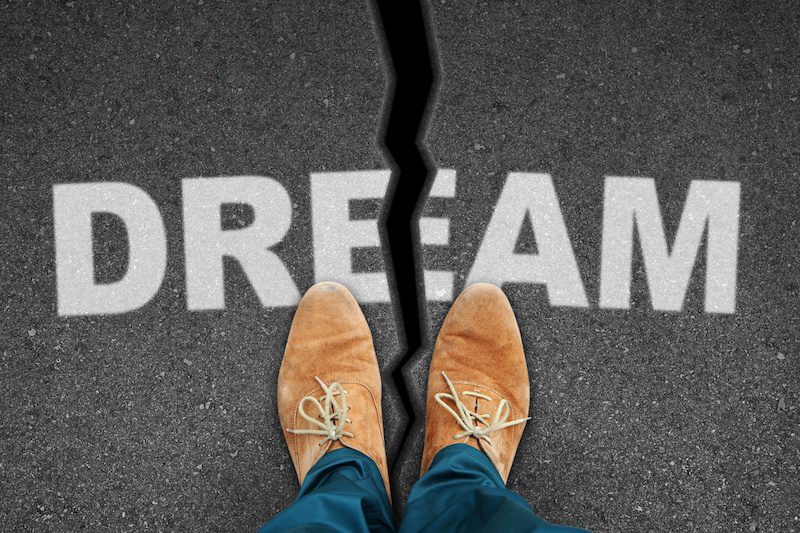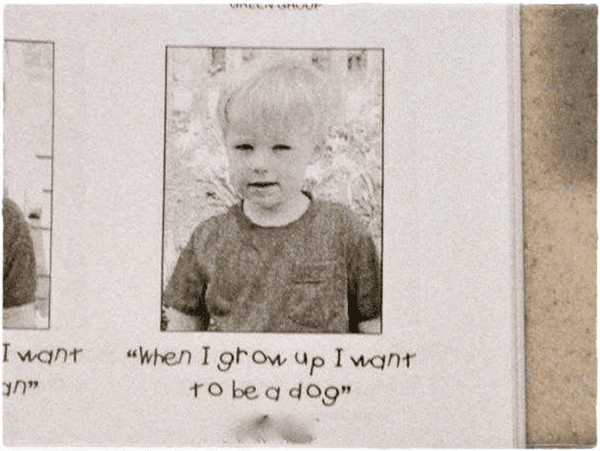Building Resilience, Newsletter Articles, Posts for Parents, Raising Adolescents, Stress
The downside of big dreams and what can help

It is considered a positive and even noble thing to encourage our children and teens to have dreams and to strive to realise them.
Those dreams may be sporting dreams, artistic dreams, travel dreams, career dreams or even dreaming of finding your soulmate. In psychology and life coaching, goal setting is considered beneficial for not only improving motivation, it can lead to greater life success and improved performance, and it can even help us improve our mental health.
Effective goalsetting is something I taught students when I was teaching, and definitely something I used when helping young people who were struggling in life.
Having a dream is much bigger than having a goal
A life dream is often something that we have had from an early age, even if we have not shared it with others. When I was a young girl I remember watching the film South Pacific and I loved listening to the film’s soundtrack.
I promised myself that one day I would visit Hawaii. It was more than a goal, because for a girl raised in the wheat belt in Western Australia, it definitely felt like a dream – almost unattainable. Interestingly, when I did finally visit Hawaii I became extremely emotional. From somewhere really deep inside me I knew that my dream as a little girl had been realised and it was an amazing feeling.
You will often hear the term dream mentioned when athletes are interviewed after winning at major sporting events like tennis tournaments or World Cup events in all areas of sports including equestrian and the Olympics. You also hear the term dream mentioned in singing talent shows on television, horse racing, mountain climbing, or even in relation to writing a book. To realise these dreams, individuals have had to use enormous persistence, grit, focus and lots of damn hard work.
I learned that there was a downside to having dreams when I was teaching.
A girl in my Year 10 class had a dream of becoming a doctor. To give her the very best chance of achieving her dream, she moved to the city to a more competitive high school. Sadly she missed the cut-off point by less than 1% and even though she was incredibly intelligent and had the most loving and supportive family, her life spiralled for a couple of years. She started a law degree, and she hated it. As a mature age student, she returned to university and finally realised her dream, just a few years later than had she achieved it straight after completing high school.
I have worked with adolescent high achievers, especially boys who sustained a serious injury which meant they were unable to compete as elite athletes ever again. Not only do these boys struggle with intense grief and irrational rage, they often drop out of school, lose friendships and struggle with depression. Sadly, I have had to work with a number of young people after they attempted to end their life, because a long-held dream had been shattered.
Dreams can come at a cost
Dr Leonard Sax, in his book Girls on the Edge: Why So Many Girls are Anxious, Wired, and Obsessed – And What Parents Can Do, shares a poignant and powerful story about a girl called Chloe who had always enjoyed sports and had a dream to reach an elite level. Over the years her passion for running became an unhealthy obsession that created a serious imbalance in her life. Her dream of being successful – at any cost – saw her friendships wither and her body struggle with injuries due to the repetitive and consistent nature of her training.
Dr Sax used this story to illustrate his concern that, rather than having a healthy pursuit of a dream, many girls are driven to please their parents, especially if they have a love of sport. He believes it is like a form of “anorexia of the soul” where the pursuit of their passion no longer brings them joy and delight. In a way, their dream has become a nightmare.
Failing a dream before you have fully matured or without significant support systems can have a devastating impact on any teen or young adult. For young men who have been raised with the influence of male norms around failure, the shame can become unbearable without support and loving big people around you.
Recently, Jamason Daniels a young retired footballer wrote a very raw and honest message about his dream of being a professional AFL player from the age of 15. In a Facebook post he wrote:
“I had put everything into becoming an AFL footballer and in my mind that was my only option – ALL or NOTHING. I spent every moment I could before and after school training.”
When he was dropped after six years, his dream exploded, and his world fell apart. He felt he had nothing left after giving everything he had to achieve that dream. He wrote that he felt like he had “fallen off a cliff” and I am sure the abrupt way his dream was destroyed felt confronting, crippling and frightening. Luckily for Jamason he had people who were there for him who helped him take steps towards his new life outside of football. And he has managed to get through some “really dark days”.
The last part of his Facebook message is one we all need to heed.
“So I ask, what more can we do for these young men and women who give everything to a sport or passion and find themselves filled with shame, embarrassment and no direction?”
There is one thing we can teach our children well before they step onto the bridge to adulthood, and that is that having a dream is absolutely okay, provided you have a backup plan, or Plan B.
This is something that can help if the ultimate dream becomes impossible. Having a second option, means that the mind doesn’t become obsessed that the dream is the only possible option.
The other important reason to teach our children and young adults about Plan B, is that we can show them that there are many ways to get to an end point. Indeed, that endpoint where we hope to find ourselves living a life of meaning with a degree of success and competence, is seriously one of the mysteries of life.
I had no goal or dream of doing what I do today; being a parenting author and educator and host of a podcast was never on my list of life goals, and yet look where I am today. Maybe we can encourage our children to focus on how they can make the world a better place one day – and reassure them that they will have to make many choices, and take many different pathways to get to do that.
There will be significant moments that feel like failure and there will be times you will question yourself deeply. Life has a habit of being unpredictable and while having a dream is a great idea, always having at least one Plan B prepares our kids for the possibility that that dream may not be the endpoint.
Who knows? Some Plan Bs end up being pretty fantastic and even better than the original dream.
As I finish writing this blog, I had a nail biting couple of hours watching the Australian Open Women’s Tennis final. To see Ash Barty, a 25-year-old enormously talented, gracious, tenacious and hardworking young woman achieve one of her dreams – in front of her loved ones and her country – was pure gold. Her comeback from 1-5 down in the second set, was a bit nerve-wracking and her gutsy effort totally brilliant!
Ash has realised her dream and she has shown that the journey can have some unpredictable turns and bumps and yet with passion, hard work, guidance and support, it can still happen.
Congratulations you are now a new Aussie legend and deserve to stand as tall as you can next to your heroes, Cathy Freeman and Evonne Goolagong-Cawley.
And I would like to close this blog with this picture that I’ve seen doing the rounds on the internet…

… A boy can dream but gee I hope he has a Plan B!
Main blog image: ©️by WoGi / Adobe Stock




 Manage Membership
Manage Membership